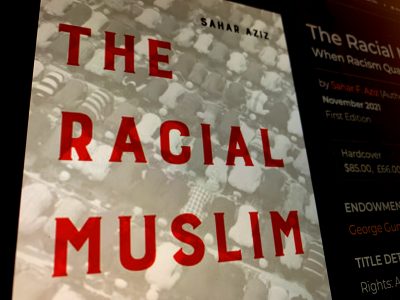Visiting law professor Sahar Aziz from Rutgers University said she had just begun her second week of law school in 2011 when the school hallways turned unusually quiet and students gathered around televisions to learn the news of two airplanes crashing into the World Trade Center.

She feared for the safety of her mother who wore the hijab. She feared for her father, she said, who “speaks with a very heavy foreign accent.” Aziz, who is Egyptian-American, said this marked the day when she “went from being racially ambiguous to racially threatening.”
“Our lives in America as invisible minorities were over,” Aziz said Thursday at the Law Tower. “We were now racial muslims.”
The Boston University School of Law hosted an in-person and live Zoom book symposium on Thursday to celebrate the upcoming publication of Aziz’s first book, “The Racial Muslim: When Racism Quashes Religious Freedom.” Along with the author, panelists included Harvard professors Kenneth Mack and Tarek Masoud and BU law professor Robert Tsai, who discussed the book and how discrimination against Muslims in the United States intersects with race and religion.
Aziz said immigrant Muslims in the United States are subject to discrimination due to a “racial, religious hierarchy,” not race alone.
“What I’m exploring in this book is being a Muslim effectively putting you in this master category where you are now racialized such that it doesn’t matter how you form your identity,” Aziz said at the event.
Aziz argues in her book that many Muslims’ identities can be solely labeled as Muslim, regardless of race.
“Even a white convert, especially a white convert female … she could say ‘I’m actually from England and my parents are Protestants and I converted,” Aziz said at the event. “Suddenly she’s not white anymore. Her racial identity socially reconstructed, and so she is now a racial Muslim.”
However, Aziz also said at the event that the experiences immigrant Muslims face in the United States vary depending on their race.
“The problem is that race matters whether we like it or not because of the history of this country,” Aziz said. “You can’t really make race not matter until you confront it.”
Masoud, a professor of public policy at Harvard University’s John F. Kennedy School of Government, said at the event that Aziz’s argument about how religion plays into race in the United States is “novel.”
“The book really I think promises to help us uncover the sources of change and variation over time and space in the treatment of religious minorities in these United States,” Masoud said at the event.“I should also say that the passion with which this book is written really makes it a pleasure to read.”
Fatima Elmansy, an attendee and student at the School of Law, said she thought the theory was “really compelling,” especially given her own experiences with bigotry in the United States.
“As an Egyptian-American myself … and as a Muslim, and I think that what she writes about and the way that she pieces together that identity or make sense of that identity as it pertains to perception in America is really interesting and something that I think about a lot,” Elmansy said in an interview after the event.
Elmansy said it’s important to discuss the intersectionality as many immigrant Muslims often do not have a chance to be vocal about their experiences with discrimination.
“I do think that Arabs and Muslims and I guess South Asians too because they’re conflated, sometimes, experience a very unique kind of bigotry in the country,” Elmansy said. “People don’t talk about where it stems from enough and people don’t have these kinds of discussions enough or hear from people who actually have these lived experiences.”
Ibrahim Ahmed Ijaz, a second-year law student at BU who attended the event, said conversations with those that identify with lesser-known Islam sects and communities create opportunities for education and discussion.
“The hope is that regular Americans might start to see Islam as a religion and not a race, and something that they can agree or disagree with on the ideas and the merits, but not hate the human being,” Ijaz said.
Aziz said that the book is her “humble attempt” to educate scholars, lawmakers and activists more deeply about the “blatant discrimination” many Muslim people face in the United States today.
“Two decades after that momentous day in 2001 that changed the lives of so many people, the U.S. government and members of the public have yet to stop punishing Muslim American communities collectively for the criminal acts of 19 foreign hijackers, who claimed kill in the name of Islam,” Aziz said.


